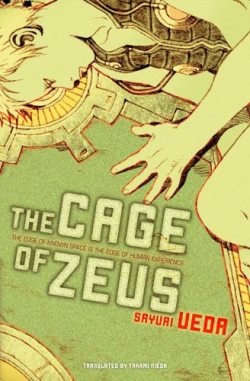The Cage of Zeus by Sayuri Ueda gives us a not-too-distant future of human exploration and habitation of our solar system, where an experimental project in the Jupiter System has engineered the Rounds: humans with ‘both’ sex organs whose gender is neither male nor female.
The reasoning for this is given early:
“To resolve the issues raised by gender differences… We’re incapable of eliminating the conflicts stemming from the differences in the sexes. And that’s only natural. Our physiology is different. So are our hormonal cycles. There’s no way to understand the other completely… But now as we’ve left the tiny confines of the solar system and are attempting to embark on a journey into the dark expanse, we can’t afford to quibble over such trifling matters. Which is why we should dispense with the problems that can be resolved by reinventing the body. A society where we are all equals, where only individual differences exist.”
The English translation uses Spivak pronouns for the Rounds, which is very pleasing. (A note at the beginning says that in the original Japanese, it was linguistically easier for the author to avoid gendered pronouns at all.)
I’m also rather fond of the idea that we must resolve binary gender conflicts before we can go further into space, but The Cage of Zeus is not exactly proposing that.
The central problem is the nature of the Rounds: people who are non-binary because of their genitals. The Cage of Zeus seeks in some small places to undermine this correlation. In rare cases, a Round will not identify as non-binary—but this means they undergo surgery to remove the genital they don’t want and live outside the Round community on the space station Jupiter-I as either a man or a woman. Once again, gender and genitals are inextricably linked.
Among the Monaurals (the other humans), it is said that: “The individual’s choice to change one’s gender however many times and to marry someone of any gender was now protected by law.” This is positive, and avoids a situation where Rounds are the only non-binary people in existence, but the wording is a bit troubling: it’s not necessarily ‘gender’ that must change. Consider the many trans* people whose gender is binary. Their gender never changes, only their body. Still, it’s good to see a future where legislation is improving.
In the many conversations in The Cage of Zeus about gender, the Rounds and Monaurals return again and again to an inseparable relationship between gender and body. It is argued that men cannot understand pregnancy while women cannot understand men’s bodies, and that this lies at the heart of the inevitable conflicts between men and women. The Rounds escape this:
“One Round was capable of knowing what it was like to both impregnate and be impregnated. Not just for a limited period but for a lifetime. That alone was enough to transform the worldview of the Round.”
This observation recurs just over twenty pages later:
“You’re restricted by one sex and possess the reproductive organs of only one sex. How does that affect the way your mind operates?”
To present reproduction as the defining human experience is deeply flawed. It is just one of many acts that some—but not all—humans engage in, with differing levels of significance—and childbearing does not define a gender. We are more complex than this.
The rigidity of this approach to gender leads to a sharp dividing line between Rounds and Monaurals. The thread running through The Cage of Zeus is the inevitability of that division: of uncertainty, confusion and hatred on the part of other humans. Arino, a Monaural guard, asks about “The feeling of complete loss when you lay eyes on a Round? That desire to know more about them, to have an accurate understanding of who they are?” This curiosity is later taken to its violent conclusion by another Monaural, Karina, who rapes Fortia, exploring eir genital configuration while doing so.
Violence drives the plot of The Cage of Zeus, in which Jupiter-I faces a terrorist attack designed to kill all the Rounds. The Rounds react to the threats (and realities) of violence with a separatist outlook. Early on, Fortia tells one of the guards sent to Jupiter-I to defend the Rounds: “We don’t need Monaurals to understand us. All you need to know is that we exist on Jupiter-I.” The Rounds’ purpose is one that almost all Rounds are very keen to carry out: exploring space without other humans holding them back and hating them.
Separatism is a sympathetic stance in the face of such violence, but its necessity speaks to the pessimism in The Cage of Zeus: humans are unaccepting of gender variance, perhaps indefinitely.
That pessimism is not a problem. I understand it. It’s provocative: we should be better than this, but we’re not, and that’s why the Rounds will eventually leave the rest of humanity and go into space. The dependence on flawed ideas—that genitals define gender, that the only escape from binary gender conflicts is to create new humans with a new genital configuration—is where it fails.
The Cage of Zeus does not propose a truly post-binary future to human space exploration. It creates a flawed addition to—a separation from—the rigid structure, but where does it leave non-binary Monaurals? Where does it leave the possibility of that structure being dismantled from the inside by people of all genders?
I enjoyed the questions The Cage of Zeus set to the future of space exploration and the treatment of gender. The answers, less so.
Alex Dally MacFarlane is a writer, editor and historian. Her science fiction has appeared (or is forthcoming) in Clarkesworld, The Other Half of the Sky, Gigantic Worlds, Solaris Rising 3 and The Year’s Best Science Fiction & Fantasy: 2014. She is the editor of Aliens: Recent Encounters (2013) and The Mammoth Book of SF Stories by Women (forthcoming in late 2014).










